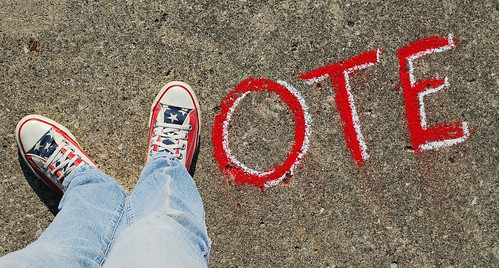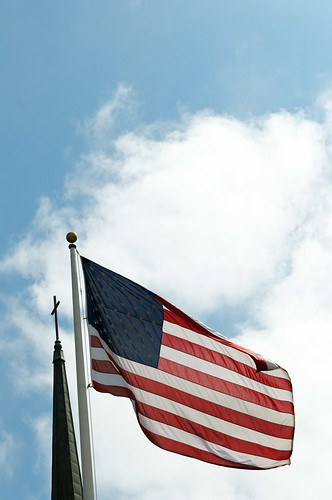It is now less than three weeks away until the 2016 U.S. Presidential election and the amount of coverage the candidates are receiving seems to be increasing by the day.
With the third and final debate now completed, voters will be making their choice about who they will be voting for to become the 45th President of the United States of America.
Possibly more so than any election in recent memory, there is a great divide among Christians about who should receive their vote and which criteria should be considered in making that choice. Without endorsing any candidates or political parties, here are five things every Christian can do this election season:
1. Pray (1 Thessalonians 5:16-18; Proverbs 3:5,6)
Pray for wisdom. Pray for the candidates. Pray for our country as we make an important decision. If you're not praying at all about who you should vote for, I wonder who it is that you're primarily listening to in order to make this decision.
If you're struggling who to vote for, pray that God would give you direction and guidance. If you've already decided who to vote for, pray that God would make it clear that is the right choice.
Look to God's Word -- the Bible -- as a guide for the qualities that God looks for in leaders and for the issues that are closest to God's heart. These may not necessarily be aligned with what is listed in the voters' guides distributed by partisan organizations. Seek God above all else.
2. Vote (Matthew 25:29; Romans 13:7)
One of the great things about living in a democracy is the privilege we have to choose our elected officials. Unfortunately, tens of millions of eligible American voters sit at home and do not participate in the political process each election cycle. If you are eligible to vote, please take advantage of this opportunity. This is a stewardship with which God has entrusted us.
Throughout the history of the U.S., there have been many people who have given their lives and put themselves at great risk in order to enjoy the privilege of voting in elections. Don't take this stewardship for granted.
We give honor to those that have gone before when we participate in the very thing for which they put their lives on the line. Don't neglect to vote.
3. Consider all the Candidates & Issues (Proverbs 8:16; 29:2)
Though we have a two-party system within the United States, there are many voters, especially during this election, that do not find either of the major party nominees an attractive option. Many have bemoaned the fact that they feel trapped into choosing the "lesser of two evils."
However, this is not necessarily true. There are more candidates than the two most prominent ones. If you feel like neither of the well-known candidates are qualified to serve as the leader of our country, consider a third party or independent candidate.
I've heard Christians say that a vote for X is really a vote for Y. Or a vote for X is really a vote for Z. Some may feel like this is "wasting a vote" or "throwing a vote away." I do not subscribe to this belief. The only wasted vote is the vote that is never cast.
In addition, the presidential election is not the only election taking place. There are federal, state and local candidates and measures to consider. Educate yourself on these other elections and cast your vote for the candidates and initiatives that most closely align to your values.
4. Respect Others (Colossians 4:6, I Peter 2:17)
It is no secret that this has been a contentious election cycle. The rhetoric surrounding this election has grown increasingly combustible. In many circles, it seems that people are not advocating for their candidate as much as expressing their disagreement with the candidate they oppose.
Sadly, this seems no different among Christians. I've been dismayed by the statements I've heard in person and the comments I've read online from otherwise pleasant followers of Christ. The attacks on those that vote differently is quite unsettling. For many of us across the political spectrum, our voting allegiances appear to have taken priority over our allegiance to Christ.
I said this on Facebook a few weeks ago and it still rings true: If there's anything we've learned within the Christian community during this election season is that people that read the same Bible and follow the same God can come to drastically different conclusions when it comes to our political preferences. Our life experiences, cultural backgrounds, friendships and news sources shape each of us more than we probably realize.
Yes, it is possible to disagree with others without being disagreeable. It is even possible to share our political views with grace, kindness and respect. But if that's not possible for us, then it's probably better to remain quiet than to dishonor God and others with political discourse that undercuts our witness as followers of Jesus.
5. Trust God (2 Chronicles 20:6, Isaiah 40:23)
When it's all said and done, God is still in control. No matter who wins or loses the election, God remains the sovereign king of the universe. Nothing -- no person, no political party, no government -- can thwart His purposes or plans.
This is not to say that who is president does not matter. It very much matters. We elect real leaders who enact real policies that affect real people. And because God cares about people, we need to care about who leads us and how their leadership affects people.
But, ultimately, God is still sovereign. He knows our realities and cares about what we are facing. Whether our candidate wins or loses, God remains our King. In this we can take comfort.
In the remaining days of this election season, please be a person who: 1) Prays, 2) Votes, 3) Considers all the candidates and issues, 4) Respects others, and 5) Trusts God.
Long after this election is over, our Christian witness, for good or bad, will remain. I fear that too many prominent Christian leaders have sacrificed fidelity to their gospel witness because of how they have chosen to engage this election cycle. Will this be said of us?





